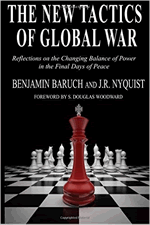By
Robert Peck
April 9, 2016
NewsWithViews.com
I expect we've all heard the phrase, “three coequal branches” used to describe the composition of our federal system of government. In fact, we've probably heard it so many times that we don't even pay attention, we just accept it as fact and move on. But, is it true? Are the three branches of our federal government really “coequal?”
When that phrase popped up in an article that I was reading a few nights ago, something rose up inside of me and said “no, the three branches are not coequal.” When I found the phrase being used in another article the next day, I started to ponder just how unequal the branches of our federal government really are.
The three branches of our federal system of government are legislative (Congress), executive (President) and judicial (Supreme Court). This is the order in which they appear in the U.S. Constitution, and it is also their ranking in the power structure.
Congress
In Article I, Section 1, we find that “All legislative powers herein granted shall be vested in a Congress of the United States.” Judicial activism and executive lust for power not withstanding, the word “all” means “ALL” and leaves no other source of legislative power, that is to say, no other source of power that has the force of law. If Congress does not pass a bill creating a law, or authorizing an expenditure, then the law doesn't exist; and the money cannot be spent because “all legislative power” is vested in Congress and nowhere else.
While Congress does have by far the greatest power within our federal system of government, we need to remember that it has only those powers granted to it in the U.S. Constitution. Article 1, Section 8 lists 17 powers granted to Congress, plus what is sometimes counted as an 18th power, which is merely the authorization to make such laws as are “necessary and proper” for carrying into execution any other duties charged to the federal government under the Constitution.
If you have not done so lately, you might want to review Article 1, Section 8. It is quite short and paints a picture of a Congress with surprisingly limited powers.
President
Article II, Section 1, tells us that “The executive power shall be vested in a President of the United States of America.” So what is “executive power?” Webster's Dictionary 1828 tells us that an executive is, “the body or person who carries the laws into effect, or superintends the enforcement of them.” So then, the President is a superintendent who is empowered to carry into effect the laws passed by Congress.
The President is not authorized under the Constitution to act unilaterally in anything except the issuing of pardons and temporarily filling vacancies when the Senate is in recess. Everything else that the President is commissioned to do is subject to the authorization of Congress.
While the President may choose to sign, or veto, bills presented to him by Congress, his veto can be overridden by a two-thirds majority in Congress. This demonstrates that Congress still wields “all” of the legislative power and ultimately has the power to require the chief executive to administer laws that he vetoed.
The office of President is managerial in nature and its power is ministerial. This is far from equal to the powers granted to Congress.
Supreme Court
Article III of the Constitution states that, “The judicial power of the United States, shall be vested in one Supreme Court, and in such inferior courts as the Congress may from time to time ordain and establish.”
The Supreme Court is the highest court in the land only in that it is the final court to which cases may be appealed. Nothing in Article III confers upon the court any extraordinary, “judicial superpowers,” enabling it to do any more than what every other court does – try cases.
As with any court, the Supreme Court's rulings are binding only on the parties named in the case. To extend the effects of a ruling beyond the parties named in the case, exceeds judicial power and goes into the legislative arena. Only a legislative body can pass legislation that is binding on the general population under its jurisdiction. The Supreme Court's jurisdiction extends only to those parties named in the cases that it tries.
In its rulings, the Supreme Court may issue an “opinion” as to the constitutionality of a statute or action related to a case, but the ruling and accompanying opinion does not automatically rescind or amend the statute in question. It is up to the corresponding legislative body (Congress or a state legislature) to decide whether to keep the statute on the books, amend it, or repeal and expunge it from the record. Executive officers (president, governor, sheriff) who are charged with administering and enforcing laws, must soberly and prayerfully consider whether the existing statute, the Supreme Court's opinion, or neither, correctly conforms to the Constitution which they are sworn to support.
Contrary to what has been widely popularized, judges do not serve for life, but only during “good behavior,” without which, they are subject to impeachment and removal by Congress. Also, the court is limited to hearing only the cases listed in Art III, Sec 2 and Congress has the power to exclude additional areas from the court's jurisdiction. It is obvious that the framers of the Constitution intentionally made the judicial branch by far the weakest of the three.
The Key to Power is in the House
It is clear that Congress has been invested with far greater power than either the executive or judicial branches. In fact, Congress was given so much power that the framers of our constitutional form of government, who jealously guarded power and protected against its abuse through the separation of powers, divided Congress into two houses – the House of Representatives and the Senate. Not only did they divide the power of Congress between two houses, but they handed the key to that power to the House of Representatives when they gave it the power of the purse.
Article I, Section 7 requires that, “All bills for raising revenue shall originate in the House of Representatives.” Everything operates by money – every bureau, agency and program. The raising and allocating of revenues determines everything that the federal government does. If the House of Representatives doesn't fund it, it doesn't happen.
In handing the purse strings to the House of Representatives, the framers were giving the key to all federal power to the body that was most directly accountable to the people. Originally, the House of Representatives was the only branch of the federal government elected directly by the people. The House is the most numerous body, with 435 members, thus diffusing the concentration of power even further. It is also the body that is on the shortest election cycle, with all members being up for election every two years, thus insuring the greatest ability for the people to remove misbehaving representatives.
If there is anything going on in our federal government that you don't approve of, blame the House of Representatives, they provided the funding that enabled it. Then, remember to blame “we the people,” as we are the ones who elect those representatives. If any offensive activity persists for more than two years, then it's our fault for reelecting the offenders as our representatives.
Beware of False Narratives
“Coequal” is just one small word, yet it has a profound effect when inserted into the middle of the description of our system of government. If we let a phrase like “three coequal branches” get into our vocabulary, it will influence our thought process, alter our perspective and ultimately change our understanding of our system of government.
Once we let that phrase get accepted into the narrative, it paralyzes our ability to argue against executive usurpation and judicial overreach. If the executive branch really is “coequal” with the legislative, then why shouldn't the President's executive orders and other actions have the force of law just like Congress? And if the judicial branch really is “coequal” with the legislative and executive branches, then why shouldn't the court be able to repeal laws and order officials to administer its rulings as law? You cannot effectively contend for constitutionally limited government if you have allowed the debate to be framed by the false narrative of there being three “coequal” branches.
|
|
Being deceived into accepting such errant views is not just the plight of the godless who reject truth and are doomed to believe a lie. Case in point: of the two references to “three coequal branches” that I heard most recently, one was by a conservative columnist who is a former State Department official and the other was by one of our most conservative sitting U.S. Senators.
Simply calling ourselves “conservative,” or “Christian,” does not give us automatic immunity against the deception of a false narrative. The only sure guard is our own diligence and eternal vigilance.
You may remember the old bumper sticker that urges readers to “Question Authority.” My motto is “Question Everything.” Just because everyone has accepted something as fact, doesn't mean it's true.
Please, click on "Mass E-mailing" below and send this article to all your friends.
© 2016 Robert Peck - All Rights Reserved
Robert Peck lives in Spokane Valley, Washington, where he is occupied in property management and is an advocate for the political values of Christian Constitutionalism. He serves in the Constitution Party, publishes articles and provides technical support to several podcasts and websites. Bob enjoys the outdoors, including hiking in the woods and riding his motorcycle down the quiet back-roads of the Inland Northwest. However, most of his time and energy is devoted to those activities that Honor God, Uphold the Constitution and Contend for Liberty.
E:Mail: robertpeck@robertpeck.net
Website:
robertpeck.net














 Share
This Article
Share
This Article






